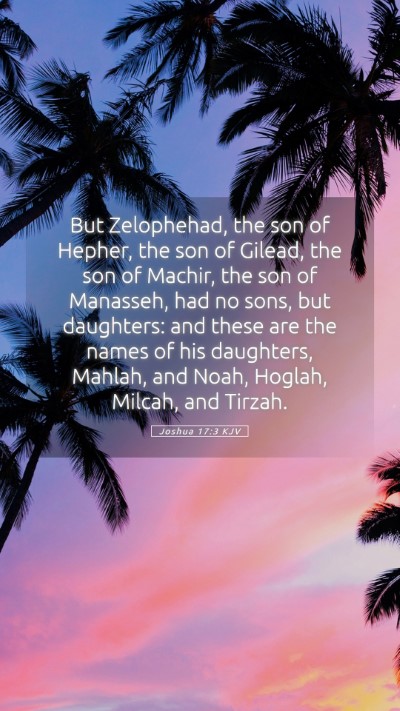Old Testament
Genesis Exodus Leviticus Numbers Deuteronomy Joshua Judges Ruth 1 Samuel 2 Samuel 1 Kings 2 Kings 1 Chronicles 2 Chronicles Ezra Nehemiah Esther Job Psalms Proverbs Ecclesiastes Song of Solomon Isaiah Jeremiah Lamentations Ezekiel Daniel Hosea Joel Amos Obadiah Jonah Micah Nahum Habakkuk Zephaniah Haggai Zechariah MalachiJoshua 17:3 Meaning
What is the meaning of Joshua 17:3?
But Zelophehad, the son of Hepher, the son of Gilead, the son of Machir, the son of Manasseh, had no sons, but daughters: and these are the names of his daughters, Mahlah, and Noah, Hoglah, Milcah, and Tirzah.
Joshua 17:3 Bible Verse Meaning
Bible Verse Meaning: Joshua 17:3
Scripture Reference: Joshua 17:3 reads, "But Zelophehad, the son of Hepher, the son of Gilead, the son of Machir, the son of Manasseh, had no sons, but only daughters; and these are the names of his daughters: Mahlah, Noah, Hoglah, Milcah, and Tirzah."
Overview of the Verse
This verse recounts the lineage of Zelophehad, emphasizing the significance of his daughters in claiming their inheritance in the land of Canaan. The passage is pivotal in understanding the inheritance laws of Israel, reflecting both the cultural norms and the shifting dynamics relating to gender roles in ancient Israelite society.
Commentary and Interpretation
Insights from Matthew Henry: Henry comments on Zelophehad's daughters as examples of faith and assertiveness in a patriarchal society. Their demand for inheritance reflects God's provision for all His people, ensuring that women also had a stake in His promises. The mention of their names is significant, as it highlights their individual identities and roles in God's plan.
Albert Barnes’ Perspective: Barnes stresses the legal backdrop, explaining that Zelophehad's daughters approached Moses to claim their father's portion, challenging the existing norms that favored male inheritance. This act not only reflects their courage but also points towards the evolving understanding of justice and equity in divine law.
Adam Clarke’s Analysis: Clarke provides a deeper historical context, noting that Zelophehad's narrative is crucial for understanding the allotment of land to the tribes of Israel. He emphasizes that the inclusion of Zelophehad’s daughters serves as a precursor to reforms in inheritance laws, ultimately showcasing God’s inclusive nature towards all His followers.
Theological Implications
This verse highlights several theological themes:
- Divine Justice: God's law ensured every individual, regardless of gender, could receive their rightful inheritance.
- Inclusion in God’s Plan: The mention of daughters acting on behalf of their father symbolizes God's invitation to all individuals to participate in His covenant promises.
- Faith in Action: The daughters' boldness in seeking their inheritance reflects the faith required to pursue God's promises actively.
Cross References
This verse connects to several important Biblical themes and passages:
- Numbers 27:1-11: Zelophehad's daughters are given the right to inherit their father's land, establishing a precedent for future generations.
- Joshua 14:1-4: The distribution of land to the tribes of Israel is foundational, demonstrating God's faithfulness in fulfilling His promises.
- Galatians 3:28: This New Testament mention of equality in Christ resonates with the themes presented in Joshua 17:3.
Application to Daily Life
Understanding Joshua 17:3 encourages believers to:
- Recognize the importance of each individual's role in God's plan.
- Encourage assertiveness in faith matters, advocating for what is just and right.
- Acknowledge that God's promises extend beyond cultural norms or limitations.
Conclusion
Joshua 17:3 serves as a profound reminder of God's justice, the importance of inclusion, and the call to active faith in claiming His promises. Through the lens of commentary and biblical analysis, we gain a richer understanding of scripture that resonates with contemporary lessons of equity and courage in the face of societal norms.


